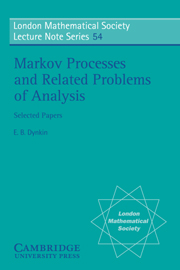Book contents
- Frontmatter
- Contents
- Preface
- I Markov processes and related problems of analysis (RMS 15:2 (1960) 1–21)
- II Martin boundaries and non-negative solutions of a boundary value problem with a directional derivative (RMS 19:5 (1964) 1–48)
- III Boundary theory of Markov processes (the discrete case) (RMS 24:2 (1969) 1–42)
- IV The initial and final behaviour of trajectories of Markov processes (RMS 26:4 (1971) 165–185)
- V Integral representation of excessive measures and excessive functions (RMS 27:1 (1972) 43–84
- VI Regular Markov processes (RMS 28:2 (1973) 33–64)
- VII Markov representations of stochastic systems (RMS 30:1 (1975) 65–104)
- VIII Sufficient statistics and extreme points (Ann. Prob. 6 (1978) 705–730)
- IX Minimal excessive measures and functions (Trans. AMS 258 (1980) 217–244)
I - Markov processes and related problems of analysis (RMS 15:2 (1960) 1–21)
Published online by Cambridge University Press: 18 March 2010
- Frontmatter
- Contents
- Preface
- I Markov processes and related problems of analysis (RMS 15:2 (1960) 1–21)
- II Martin boundaries and non-negative solutions of a boundary value problem with a directional derivative (RMS 19:5 (1964) 1–48)
- III Boundary theory of Markov processes (the discrete case) (RMS 24:2 (1969) 1–42)
- IV The initial and final behaviour of trajectories of Markov processes (RMS 26:4 (1971) 165–185)
- V Integral representation of excessive measures and excessive functions (RMS 27:1 (1972) 43–84
- VI Regular Markov processes (RMS 28:2 (1973) 33–64)
- VII Markov representations of stochastic systems (RMS 30:1 (1975) 65–104)
- VIII Sufficient statistics and extreme points (Ann. Prob. 6 (1978) 705–730)
- IX Minimal excessive measures and functions (Trans. AMS 258 (1980) 217–244)
Summary
The intimate connection between Markov processes and problems in analysis has been apparent ever since the theory of the former began to develop. It is not without reason that A. N. Kolmogorov's paper [39] (Russian translation [38]) of 1931, which is of fundamental importance in this domain, was entitled “On analytical methods in probability theory”. The investigation of these connections also forms, to a large extent, the subject matter of A. Ya. Khinchin's book of 1933 on “Asymptotic laws of the theory of probability” [52] (Russian translation [51]).
In the fifties, and more particularly during the last five years, the theory of Markov processes entered a new period of intense growth. If previously the connections between probability theory and analysis were somewhat one-sided, probability theory applying results and methods of analysis, now the opposite tendency increasingly asserts itself, and probabilistic methods are applied to the solution of problems of analysis. Methods belonging to the theory of probability not only suggest a heuristic approach, but also, in many cases, yield rigourous proofs of analytic results. Applications of the methods of the theory of semigroups of linear operators have led to far-reaching advances in the classification of wide classes of Markov processes. New and deep connections between the theory of Markov processes and potential theory have been discovered. The foundations of the theory have been critically re-examined; the new concept of a strongly Markovian process has acquired a crucial importance in the whole theory of Markov processes.
Information
- Type
- Chapter
- Information
- Markov Processes and Related Problems of Analysis , pp. 1 - 24Publisher: Cambridge University PressPrint publication year: 1982
